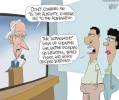Stopping to think who’ll pay the bill
If Nevada employers thought they were already facing enough of a struggle trying to keep their doors open and their work force stable, wait till they get a load of 2013.
First there’s ObamaCare, of course, the multi-billion-dollar tax hike that will effectively penalize employers who attempt to keep more workers on the payroll “full-time” (whether the drafters initially thought that through, or not.) But Nevada employers got still more grim news last Tuesday.
Thanks to the years-long recession, State Employment Security Division administrator Renee Olson announced Nevada will be increasing by an average of 12.5 percent the unemployment tax rate that companies pay each year to fund unemployment benefits for laid-off workers.
Depending on how often companies lay off workers, the actual tax rate varies from 0.25 percent to 5.4 percent. The average increase amounts to $77 a year per employee.
On top of this, companies will be hit with a federal unemployment tax increase of $21 per employee in January.
And Ms. Olson also wants the Legislature to approve two other new state taxes – one to cover interest on the $676 million the state has borrowed from the federal government to cover unemployment benefits, and the other to more quickly pay off the debt and bring the state back into solvency.
Representatives of the Nevada Taxpayers Association, the Las Vegas Chamber of Commerce and the Reno-Sparks Chamber of Commerce all testified last week that the 12.5 percent state tax increase was necessary.
Maybe. But it’s also a surefire job killer, and another example of the government extending relief in ways that are politically popular at the time, without stopping to consider what the long-term costs are going to be – and who’s going to pay them.
As business economics are rarely taught in the high schools these days, there seems to be a widespread perception that when business owners warn they’ll have to trim their payrolls in proportion as new costs are imposed on them, these are arbitrary threats that can easily be waived, like dad warning he might “ground” a teen-ager who isn’t home by curfew.
After all, the theory goes, business owners can just pass along these costs to customers.
In fact, prices are not endlessly elastic. At some point, customers go away and don’t come back. Employers know how much each employee costs them. The rest is simple arithmetic.
In Carson City, Democratic legislative leaders have announced they’ll launch a broad review of the state’s tax structure during the first week of the upcoming biennial session, considering everything from a new business tax or services tax to lifting a 5 percent constitutional cap on mining taxes.
In other words, their “broad review” seems more designed to seek new revenues than to figure out how to prevent more layoffs and business closures in the taxpaying private sector.
“If we really need to find solutions for Nevada, we have to put everything on the table,” says Senate Majority Leader Mo Denis. “I want to listen first.”
Business owners may find themselves a little busy meeting with their accountants to get the bad news, early next year, while bureaucrats looking forward to spending all those new revenues will have plenty of time to testify to the Legislature about their “needs.”
Democratic Assembly Speaker Marilyn Kirkpatrick also said the Legislature may consider an alternative to the 2 percentage point business margins tax that the Nevada State Education Association wants to put before the Legislature in February. The state Supreme Court began reviewing the union’s initiative, which was rejected by a lower court, last week.
The teachers union estimates its proposed tax – on operations bringing in $1 million or more annually – would bring in an additional $800 million. The tax would hit particularly hard at struggling businesses, since it’s designed to tax revenues regardless of whether a business is actually operating at a profit.
If the appeal to the state Supreme Court is granted and the petition signatures verified, the Legislature must immediately take up the tax initiative, giving it precedence above all other legislation. If the Senate and Assembly fail to pass it with a two-thirds majority, the tax initiative would be placed before voters in the 2014 general election.
Mr. Denis’ assertion that he wants to “listen” is welcome. Before jamming more tax hikes into the pipeline, the delegates need to reach out the business community and make sure they also hear from those who will be footing the bills – assuming they survive.


















